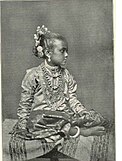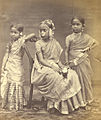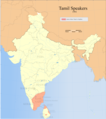Portal:Tamils
The Tamils portal
The Tamil people, also known as Tamilar (Tamil: தமிழர், romanized: Tamiḻar, pronounced [t̪amiɻaɾ] in the singular or தமிழர்கள், Tamiḻarkaḷ, [t̪amiɻaɾɡaɭ] in the plural), Tamilians, or simply Tamils (/ˈtæmɪlz, ˈtɑː-/ TAM-ilz, TAHM-), are a Dravidian ethnolinguistic group who natively speak the Tamil language and trace their ancestry mainly to India's southern state of Tamil Nadu, to the union territory of Puducherry, and to Sri Lanka. The Tamil language is one of the world's longest-surviving classical languages, with over 2000 years of Tamil literature, including the Sangam poems, which were composed between 300 BCE and 300 CE. People who speak Tamil as their mother tongue and are born in are considered Tamils.
Tamils constitute 5.9% of the population in India (concentrated mainly in Tamil Nadu and Puducherry), 15% in Sri Lanka (excluding Eelam Moors), 7% in Malaysia, and 5% in Singapore. From the 4th century BCE, urbanisation and mercantile activity along the western and eastern coasts of Tamilakam -- what is today Kerala and Tamil Nadu -- led to the development of four large Tamil empires, the Cheras, Cholas, Pandyas, Pallavas, and velirs and a number of smaller states, all of whom were warring amongst themselves for dominance. The Jaffna Kingdom, and vanni chieftaincies inhabited by Eelam Tamils, was once one of the strongest kingdoms of Sri Lanka and controlled much of the north of the island. (Full article...) Selected article -Sri Lankan Tamil nationalism is the conviction of the Sri Lankan Tamil people, a minority ethnic group in the South Asian island country of Sri Lanka (formerly known as Ceylon), that they have the right to constitute an independent or autonomous political community. This idea has not always existed. Sri Lankan Tamil national awareness began during the era of British rule during the nineteenth century, as Tamil Hindu revivalists tried to counter Protestant missionary activity. The revivalists, led by Arumuga Navalar, used literacy as a tool to spread Hinduism and its principles. The reformed legislative council, introduced in 1921 by the British, was based on principles of communal representation, which led the Tamils to realize that they were the minority ethnic group and that they should be represented by a member of their own community. It was under this communal representation that Tamil national awareness changed to national consciousness—a less passive state. They formed a Tamil political party called the All Ceylon Tamil Congress (ACTC). In the years leading to Sri Lankan independence, political tension began to develop between the majority Sinhalese and minority Tamil communities as the ACTC, citing the possibility of the majority Sinhalese adopting a dominant posture, pushed for "fifty-fifty" representation in parliament. This policy would allot half the seats in parliament to the Sinhalese majority and half to the minority communities: Ceylon Tamils, Indian Tamils, Muslims and others. (Full article...)General imagesSelected biography -Valangaiman Sankaranarayana Srinivasa Sastri CH PC (22 September 1869 – 17 April 1946) was an Indian politician, administrator, educator, orator and Indian independence activist. He was acclaimed for his oratory and command over the English language. Srinivasa Sastri was born to a poor temple priest in the village of Valangaiman near Kumbakonam, India. He completed his education at Kumbakonam and worked as a school teacher and later, headmaster in Triplicane, Madras. He entered politics in 1905 when he joined the Servants of India Society. Sastri served as a member of the Indian National Congress from 1908 to 1922, but later resigned in protest against the non-cooperation movement. Sastri was one of the founding members of the Indian Liberal Party. In his later days, he was strongly opposed to the partition of India. Srinivasa Sastri served as a member of the Madras Legislative Council from 1913 to 1916, Imperial Legislative Council of India from 1916 to 1919 and the Council of State from 1920 to 1925. Sastri also functioned as India's delegate to the League of Nations, as member of the Privy Council of the United Kingdom and agent to the Union of South Africa. (Full article...)CategoriesTopicsTamil People Countrywide: India • Sri Lanka • Canada • Malaysia • Singapore • South Africa • England Related Ethnic Groups: Brahui • Gond • Kannadiga • Khonds • Kodava • Oraon • Malayali • Telugus • Tuluvas Related indigenous Groups: Badagas • Toda • Kuruba
See also: List of Tamil people, Tamil script, Tamil Script Code for Information Interchange Related portalsWikiProjectsThings to do
Associated WikimediaThe following Wikimedia Foundation sister projects provide more on this subject:
Discover Wikipedia using portals |































































